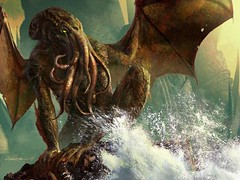Dot in the Sky (![[personal profile]](https://www.dreamwidth.org/img/silk/identity/user.png) dotinthesky) wrote2011-11-13 04:58 pm
dotinthesky) wrote2011-11-13 04:58 pm
Entry tags:
Words of the Cthulhu
Lovecraft's "Call of the Cthulhu," as well as its immediate predecessor, Machen's "The Great God Pan" are about data management. I love that Cthulhu has as its ratiocinative center a "clipping agency" -- something that I don't think exists anymore, or exists only in highly rarefied modes, because of the web. It comes as no surprise that these weird stories have as their core, an engine of information technology, or even just the impulse to make meaning out of information gone awry, since it has always been recognized that the supernatural is also a type of allegory of information -- no more so than in Bram Stoker's Dracula of course. We can talk about Dickens' "The Signal Man" also, and things like The Hunchback of Notre Dame which, at least in the 1939 film version, has at its core, a debate about the merits of the Gutenberg press. We could go on and on with examples both obvious -- dealing with the "uncanny" impact of any new technology -- and implicit: that all supernatural literature spectacularly stages the absences that communication both exacerbates and attempts to repress.
This Mysterious 'This': Joe Milutis in conversation with Eugene Thacker

no subject
There's an inherent conservatism to a lot of supernatural fiction (for all its desire to unsettle, there's an inherent cosiness to the genre) so it makes sense that it would be distrustful of technological advances.
no subject